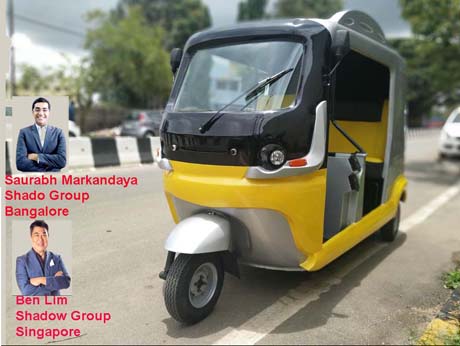
Bangalore, August 14, 2019: The leading provider of Electric Vehicle technology and charging infrastructure from Singapore – SHADO Group has unveiled India’s first affordable, low voltage, high-performance instantly-charged electric three wheeler: ERICK.
Developed by Adarin Engineering Technologies, a SHADO Group company, ERICK is aimed at the Indian commercial market, has a range of 70KM per charge, is capable of operating at high ambient temperatures and exceeds traditional gasoline, CNG and diesel vehicles in performance. The proprietary ultracapacitor battery is able to charge in minutes – SHADO Group is the only company in Asia that provides this capability – from on-grid fixed charging stations or off grid mobile solar powered charging points.
ERICK comes in two variants – the passenger and the cargo three-wheeler version – and will equip drivers and fleet owners in India with a powerful, robust transport solution and empower owners to develop – and profit from – their own charging infrastructure. The SHADO Group is set to invest over US$10 million over two years in its factory in Pune, India, with plans to manufacture up to 1,000 units per month for the Indian market. The vehicles are designed and manufactured by Bangalore-based Adarin Engineering Technologies following a merger with SHADO Group.
“The needs of drivers and fleet owners in India are simple when it comes to their vehicles: cheaper to operate, durable and with lower charging downtime. SHADO Group have matched and gone beyond these requirements,” says Dr. Saurabh Markandeya, Co-CEO & Executive Director for SHADO Group, adding “Our three wheelers are able to match and even exceed existing equivalent gasoline and diesel engines yet with lower maintenance and zero emissions. The batteries charge in minutes and last 20x longer than existing electric ones on the market and do not degrade even in temperatures ranging from -25 to +60 Degree Celsius – this is the robustness that Indian owners are looking for. Lastly, they ERICK is affordable, costing just Rs 1.50 per km."
Deep technology and robustness
The technology behind ERICK is the result of years of R&D conducted in Singapore and India that has produced a number of patented products. The Powertrain within ERICK is powered by ‘Electrans’, an indigenously developed electric powertrain consisting of a low voltage motor integrated with differential and a liquid-cooled motor controller delivering extreme torque even at low speeds. This means that drivers can carry heavier loads (up to 500kg) while managing a range of hillslopes without any loss of performance. Electrans may also be used in other vehicle and chassis types. It can also be used to convert existing fossil fuel-powered auto-rickshaws, cars and light trucks.
The ultracapacitor battery uses di-electric material which does not produce any chemical reaction (unlike traditional Lithium ION batteries) meaning they last much longer and charge quicker. The battery performance is managed by SHADO Group’s proprietary AI-based self-learning algorithm for passive and active balancing, ensuring consistent power output and efficient charging.
By offering an electric three-wheeler solution that matches or exceeds the performance of equivalent fossil fuel-powered vehicles yet charges in minutes, SHADO Group have solved the challenge that traditional electric vehicles face: namely, long charging times. Electric vehicle fleet ownership and management becomes much easier and more profitable when vehicles are not spending hours re-charging, instead Erick’s drivers are able to access a number of charging options. These include on-grid charging stations in set locations that are connected to the electric grid. They may also access solar-powered mobile charging stations located in carparks, side streets or other easily accessible places within a city.
To drive the creation of a charging ecosystem, SHADO Group allow fleet owners and entrepreneurs to invest in the charging stations themselves and allow other owners to charge their vehicles on a “Pay-For-Kilometres” basis. As owners generate profit and expand their charging network we will see the development of a city-wide charging ecosystem will evolve that is able to support both SHADO and non-SHADO vehicles, laying the groundwork for the wider adoption of electric vehicles among consumers.
“We will not see the mass adoption of electric vehicles in India – or Asia – without adequate charging infrastructure” continues Dr. Markandeya, “Electric vehicles need to match traditional vehicles in performance, cost and durability, as well as have the requisite charging infrastructure in place. Until now, existing vehicles take too long to charge, are expensive and charging stations are few and far between. By starting with India’s SMEs and entrepreneurs, SHADO Group intend to build out a country-wide charging ecosystem that will go on to enable the widespread consumer adoption of electric vehicles”.
The SHADO Group headquarters are in Singapore, with a R&D centre in Bangalore, Manufacturing plant in Pune, India and an R&D office in Malacca, Malaysia